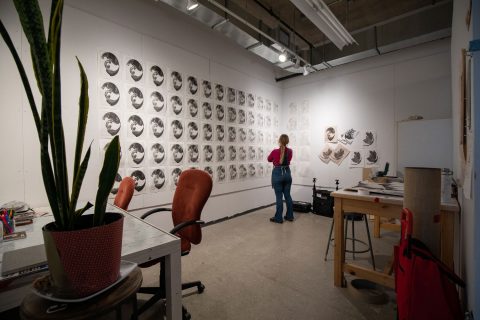Film and Moving Image Studies (MA)
Program overview
The MA in Film Studies examines film as an artistic, cultural, and political medium. The main objective of this program is to expose students to different methodologies of film and media analysis, in order to understand the role of moving images in society and history. The program encompasses aesthetics, theory, and research methods that will help enable students to navigate their own relationship to the complex and pervasive viewing experiences of our digital world. While exploring the latest developments in moving image culture, we encourage students to develop their own research projects. You will connect with a dynamic group of students and develop your own areas of interest and benefit from some of the best research labs in Canada. Our internationally-renowned faculty is comprised of academics from a multitude of disciplines and institutions and includes four research chairs. Montreal's exceptional range of film venues, museums, galleries and artist-run centres means that students live and work in an incredibly vibrant and inspiring urban environment.
Program structure
Degree Requirements
Fully-qualified candidates are required to complete a minimum of 45 credits.
Please see the Mel Hoppenheim School of Cinema Courses page for course descriptions.
Film and Moving Image Studies MA (45 credits)
| 6 | credits of Film and Moving Image Studies MA Required Courses |
| 39 | credits chosen from one of the following options: |
Film and Moving Image Studies MA Option A - Thesis (39 credits)
| 12 | credits of Elective Courses chosen from the Film and Moving Image Studies MA Courses Note: The maximum value of practicum (internship) credits allowable in this option is 6. |
| 3 | credits:
|
| 3 | credits:
|
| 21 | credits:
|
Film and Moving Image Studies MA Option B - Course-based (39 credits)
| 39 | credits of courses chosen from the Film and Moving Image Studies MA Courses list. Note: The maximum number of practicum (internship) credits allowable in this option is 12. |
Film and Moving Image Studies MA Required Courses (6 credits)
| 3 | credits:
|
| 3 | credits chosen from:
|
Film and Moving Image Studies MA Courses
Admission requirements
Admission Requirements
- Undergraduate degree in Film Studies (or related field) with a minimum B average (GPA 3.00)
- Applicants may be requested to attend an interview with the graduate committee.
- Proficiency in English. Applicants whose primary language is not English must demonstrate that their knowledge of English is sufficient to pursue graduate studies in their chosen field. Please refer to the English language proficiency page for further information on requirements and exemptions.
Application process
Application deadlines

FALL
December 15

WINTER
n/a

SUMMER
n/a
Priority will be given to complete applications submitted by the deadline. In some cases, programs may continue to accept applications as long as there is space available.
International students: Considering the waiting period involved in meeting the entry requirements to Canada and Quebec, we strongly encourage international applicants to apply early and submit supporting documents prior to the deadline.
Tuition & funding
Tuition and fees
Tuition and fees of the program may depend on your student status, among other key factors. Estimate these costs based on the most common situations.
Awards and funding
Funding packages are generally available for students in thesis-based programs. They come in the form of awards, teaching and research assistantships are offered at the time of admission to most students to allow them to focus on their research and studies. Research and thesis-based students are automatically considered for all entrance graduate awards when they apply to Concordia, provided they meet eligibility criteria. No separate application is required.
The Quebec and Canadian governments offer a number of competitive graduate scholarships. We encourage you to apply for these awards at the same time you are preparing your application.
Out-of-province students
Get up to $9,251 in special funding for master's programs. Learn more
Other programs of interest

Find your unique voice and challenge yourself in a studio-oriented environment of rigorous critical inquiry in the three-year disciplinary MFA in Studio Arts.
Department
Faculty

